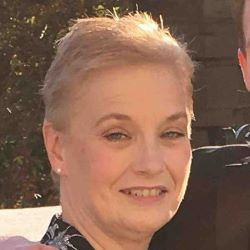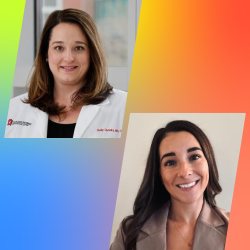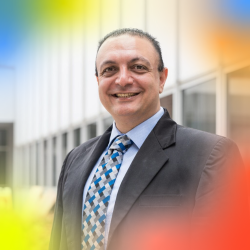If there wasn’t already a general awareness among the personnel of the Penn State Cancer Institute Clinical Trials Office that February is National Cancer Prevention Month, you may guess the fact that breast cancer survivor Doris Shank, BSN, MSN, administrative director of the office, is preparing for her second cancer-related surgery soon has brought the topic of prevention to mind for some of them in any event.
Shank, an ACRP member and professional in the world of clinical trials since the early 1990s, recently wrote for the Penn State news website about her experiences from “the other side”—as a cancer patient—after her unexpected diagnosis following a regularly scheduled mammogram in late 2022.
“You could have knocked me over with a feather,” she wrote in her Penn State article. “The irony―I am a cancer nurse and have been all my career. …My office manages all of the cancer clinical trials for all types of cancer. …Just this year, Penn State Cancer Institute has participated in 10 treatment trials for breast cancer alone.”
Her experiences in working through her entire 12-week round of initial chemotherapy and all the tough times that came with it, recovering from surgery for a bilateral mastectomy, and, lately, more chemo and radiation treatments since the cancer had spread to her lymph nodes and preparation for follow-up surgery, have still left Shank feeling “thankful for every one of these painful, uncomfortable moments. They save lives. They’re saving my life. We owe all of it to clinical trials—to the people who volunteer to use their own bodies to further the science, and to the researchers who tirelessly work to find new ways to stop what once seemed unstoppable. …Every drug I have received so far is the result of men and women participating in clinical trials that have shown these drugs are safe and effective in the treatment of breast cancer. The same applies to drugs for other cancers. The research toward a cure continues. The brave men and women who volunteer know that they are making a difference in the future treatment of breast cancer.”
Shank is also thankful for the office team that she works with. “Without them, I would have never made it,” she noted. Meanwhile, “The goal of me going public with my story was to provide awareness about the importance of women getting their screening mammograms, and the importance of participating in clinical trials, as they are the initial leg of the approval process for what we use today to treat cancer,” she told ACRP. “Our biggest challenge is to change the way our community thinks about clinical trials and to get rid of the ‘guinea pig’ ideation, which one still encounters in both rural and urban patients.”
Saying that, taking care of cancer patients is all she ever wanted to do since graduating from nursing school in 1986. Shank recalls, “Part of my journey included having a mentor who taught me all about protocol compliance, monitoring, auditing, and U.S. Food and Drug Administration (FDA) inspections. This part of my career has helped me understand what the regulations ‘mean,’ and how to relay those meanings to my team and keep the principal investigators aware that they need to always be ‘audit ready.’ I spent some time as the Director of Compliance in a large academic medical center in Philadelphia, and I cherish the work I do now at Penn State Cancer Institute.”
Although found to be cancer-free as of her last set of scans, Shank is still receiving chemotherapy until March of this year, and expresses how grateful she is for her doctors, nurses, and healthcare workers. “They’re part of a long line of researchers and providers working arm-in-arm for more than a century that have brought me and countless patients like me to this moment,” she wrote. “Without clinical trials, there would be no cancer treatment. People like me would have no hope.”
Then Shank added to ACRP, “Those of us in clinical research feel that those who volunteer to participate in clinical trials are noble quiet heroes and heroines. There may be a chance that those participants will get some benefit from joining studies, but it’s also known that what they do now may have a greater impact on others in the future. That is the noble part.”
Telling her story is a way to let others know that while “being diagnosed with cancer is scary, letting it go and having it spread is not necessary when early detection is a better option that could lead to a cure.” Shank notes, “If you feel a lump, get to your doctor. One thing all the research agrees on: Waiting will not make it go away.”
Edited by Gary Cramer



